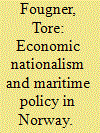|
|
|
Sort Order |
|
|
|
Items / Page
|
|
|
|
|
|
|
| Srl | Item |
| 1 |
ID:
071599


|
|
|
|
|
| Publication |
2006.
|
| Summary/Abstract |
Are certain countries more likely to comply with international law than others? History has provided an interesting test of several competing theories of international rule compliance in the form of the UN Security Council's Resolution 1373 to combat international terrorism. We apply a mix of quantitative and qualitative methods to test the salience of various national characteristics - domestic political culture, national interests, regionalism, dependency, power, international alliance patterns, past patterns of compliance. In the end, while all the factors seem to have a bearing on the outcome, regionalism and past patterns of compliance emerge as particularly significant.
|
|
|
|
|
|
|
|
|
|
|
|
|
|
|
|
| 2 |
ID:
071601


|
|
|
|
|
| Publication |
2006.
|
| Summary/Abstract |
While celebrating recent efforts to redefine 'economic nationalism' by placing nationalism and national identity - rather than the state or illiberal economic policies - at its core, this article takes issue with the tendency to provide an unnecessarily narrow specification of a new research agenda on economic nationalism. More specifically, it argues that the agenda should concern not merely how national identities and nationalism influence economic policies and processes, but also how the latter can influence the former. An argument is also made for this twoway relationship to be conceived in constitutive terms, and a study of the efforts to develop a maritime policy in Norway in the mid-1990s is presented to show the usefulness of this reformulated research agenda on economic nationalism.
|
|
|
|
|
|
|
|
|
|
|
|
|
|
|
|
| 3 |
ID:
071603


|
|
|
|
|
| Publication |
2006.
|
| Summary/Abstract |
A theoretical appraisal of the Swiss and Norwegian models of relations with the European Union (EU), as well as an empirical assessment of experience accumulated, shows that the European Economic Area (EEA) model is quite constraining. Both models have semi-colonial features. In the EEA model, the non-EU member has a little more influence on decision-making but is less independent of the EU than with the Swiss approach. The latter is time-consuming and is subject to much give and take. In the long run, however, countries expected to benefit from the new European Neighbourhood Policy, such as Israel, might find that an EEA approach is not acceptable if it does not offer membership as a long-term possibility, because it is undemocratic. Finally, in the eventuality of a trade war between the United States and the EU, a scenario of high relevance for Israel, the Swiss model would give it more freedom of manoeuvre than the EEA model. Israel would not be part of the EU trading bloc in the eyes of the United States.This is much less clear in the event of EEA membership. On the other hand, an in-depth examination of the Swiss model shows that the 'à la carte' approach does not allow for any degree of depoliticization in relations with the EU, as Israel was hoping for.
|
|
|
|
|
|
|
|
|
|
|
|
|
|
|
|
| 4 |
ID:
071597


|
|
|
|
|
| Publication |
2006.
|
| Summary/Abstract |
Why are international institutions designed in one way and not another? Using the European security and defence policy (ESDP) as a case study, this article suggests that the social representations dominating the national and organizational world of institution-makers are key to our understanding the shape and content of an emerging institution of international security cooperation.A focus on social representations, which are the product of institutional practices, helps to break the interest/idea dichotomy that underpins most theories of preference formation when they try to explain institutional designs.This article shows that foreign and defence policy-makers from France, Germany and the United Kingdom have shaped ESDP by projecting their respective social representations, notably with regard to the role of the state, the nature of security challenges and the purpose of their organization.
|
|
|
|
|
|
|
|
|
|
|
|
|
|
|
|
|
|
|
|
|